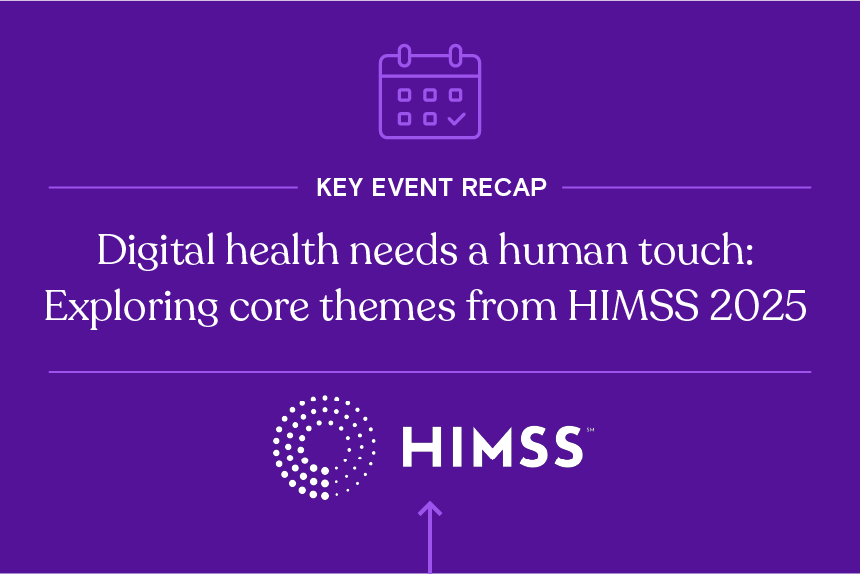Last week, the American College of Gastroenterology (ACG) welcomed industry leaders and colleagues back to Las Vegas for another year of insightful events and deep learning experiences.
This year also marked ACG’s first in-person and online conference since the pandemic, and the organizers made sure this year’s meeting was extraordinary.
We had a wonderful time! It was great reconnecting with clients, diving into the latest trends and talking about all the new and exciting things happening at Definitive Healthcare. We a had a ton of great conversations at our booth, across the exhibit hall and at various sessions, so we rounded up four of the most important things we learned that you should know.
Healthcare data plays a crucial role in finding difficult to diagnose patient populations
Some of the best conversations we had at ACG started right at our booth, where we had the chance to talk about Latitude Reporting, a new tool from Definitive Healthcare that helps companies find and build their ideal patient cohorts.
Mike Soucey, one of our Sales Executives, noted how players in the gastroenterology space acknowledged how challenging it could be to identify patient populations with acutely specific symptoms. One rep from a medical device company Mike spoke to described it as “one of the biggest challenges we’re dealing with right now.”
Many of the attendees who stopped by our booth were excited to see that Latitude Reporting makes it easier to find the patients they’ve been looking for and glean meaningful intelligence they can use immediately. Biopharmaceutical companies, healthcare IT vendors and any business that uses prescription or medical claims data to shape its commercial strategy will find Latitude Reporting extremely valuable.
We premiered Latitude Reporting at HLTH 2021. You can read our recap to catch up on some of the biggest challenges healthcare leaders were talking about at that event.
Telehealth has earned its place post-pandemic
On the first day of ACG, we attended several sessions discussing the future of gastroenterology, including Dr. Nipun Reddy’s talk on the pitfalls and added costs to providing telehealth.
Everyone knows that COVID-19 changed the ways patients interact with physicians, and telehealth has proven to be instrumental in bridging the gap and enabling access to convenient, safe care. But, after some conversations with other attendees, it was insightful to learn first-hand what certain companies were experiencing.
From what we learned, telehealth services are a valuable component of any healthcare provider’s toolbox, but certain specialties benefit more from telehealth than others. Telehealth is a great fit for gastroenterology, as providers can use it as the primary means to assess and treat common conditions such as irritable bowel syndrome or constipation. The doctor could recommend specific at-home interventions or prescription drugs and then continue to monitor and adjust care potentially without the need for a face-to-face visit.
Doctors treating more serious conditions like Crohn’s disease or cirrhosis may use telehealth after an initial in-person meeting, as these conditions might require more comprehensive testing to diagnose that isn’t possible over the phone. According to a 2019 study, telemedicine can help doctors improve patient outcomes and reduce hospital readmissions by providing a convenient way “to monitor, educate and engage with patients.”
Much of what we learned supported findings we gathered on telehealth’s trajectory in a post-pandemic world. Check out the webinar we recorded to learn more about how telehealth is also addressing staffing shortages, provider burnout and more.
As talent resources get tighter, the need for quality staffing placement is only increasing
COVID-19 has created significant staffing challenges. And while nurses and locum tenens are in high demand across the country, the U.S. is projected to see a shortage of 54,000 to 139,000 physicians by 2033.
Amid all this, healthcare staffing companies are trying to:
- Locate new job openings and opportunities
- Contact department heads and hiring managers
- Place qualified candidates in the right role
Britney Morin-Mezzadri, a Principal Customer Success Manager at Definitive Healthcare, talked with many folks from hospitals and staffing agencies at ACG. Acutely aware of the challenges in the staffing industry at the moment, they were interested in learning more about the state of the gastroenterology market and how they could more effectively leverage healthcare commercial intelligence to find the right physicians or executives.
Genomics and precision medicine presents new opportunities to treat hereditary cancers
One of the major discussions at ACG was about how the era of precision medicine has arrived.
At the seminar “Genetic Testing and Counseling,” a panel of genetics experts spotlighted how cutting—edge diagnostic tools, a better understanding of genomics, and the shift to precision medicine are pioneering more effective detection and treatment of hereditary cancers.
For providers, a more precise diagnosis means a greater understanding of the patient and the type of patient they have, leading to more effective treatment options. Life sciences companies can benefit immensely, too, as precise data on cancer behaviors and treatments can improve research and the development of new therapies going into the market.
We held an insightful webinar with Genomics Consultant Tamoor Sial, which covered the past, present and future of genomics and diagnostics in the era of precision medicine. Watch “The big data around diagnostics” to learn more.
Ready for what’s next!
From the many, many conversations we had at ACG, it’s clear that some of the biggest healthcare leaders in gastroenterology are eager to tackle the challenges of the future. And we’re excited to help them use healthcare commercial intelligence to overcome those challenges.
If you missed us at ACG or couldn’t make it to the show, we have a ton of new things to show you. Start a free trial to learn more.





